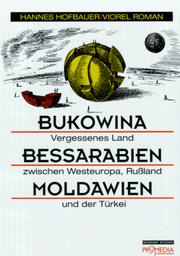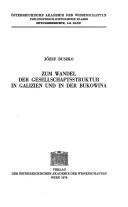| Listing 1 - 9 of 9 |
Sort by
|
Periodical
Abstract | Keywords | Export | Availability | Bookmark
 Loading...
Loading...Choose an application
- Reference Manager
- EndNote
- RefWorks (Direct export to RefWorks)
Book
Year: 2010 Publisher: Wien : Böhlau,
Abstract | Keywords | Export | Availability | Bookmark
 Loading...
Loading...Choose an application
- Reference Manager
- EndNote
- RefWorks (Direct export to RefWorks)
Bucovina was an integral part of Habsburg Empire since 1775. Starting from a pure political construction on the European map of power at the end of 18th century this small area developed into a well integrated Austrian crown land. A crown land, which succeeded to form a certain regional identity - conform to the Habsburg state ideology. Till the outbreak of First World War national rivalries played a certain role for regional politics in the county but were moderate in general. Especially this situation was grounded in a direct liaison of this small province situated on the Eastern slopes of Carpathians with Vienna as imperial centre. A development which aimed towards steadily improving inner consolidation and balance in comparison with the other crown lands of the Empire. Only the outcome of the First World War, as Bucovina became part of the Romanian kingdom, losing its geo strategic position as a bridge between East and West, showed in its consequences the former importance of this organic exchange with Vienna, shaping the provinces society and cultural landscape. The genesis of Bucovina region at the periphery of a European Empire from the end of 18th up to the beginning of 20th century as well as the structural persistence of the cultural landscape's characteristics is centrally focussed in this study. The analyses of spatial processes as well as their genesis, shaped by a changing geopolitical situation, were of main interest for the research. Since the midst of 19th century a serious and existential national tension within the Bucovina was growing which could only partially be influenced by the province politics itself. A tension in between a search for a distinguished political position, the new idea of nation state and a overall-covering ideology of Commonness, a tension between growing regional identity, of beeing Bucovina and increasing national claims. The study tries to draw a knew, integral and less known picture of this variously shaped cultural landscape - apart from common nationalistic and segmented analyses.
Book
Year: 2010 Publisher: Böhlau
Abstract | Keywords | Export | Availability | Bookmark
 Loading...
Loading...Choose an application
- Reference Manager
- EndNote
- RefWorks (Direct export to RefWorks)
Die Bukowina, seit 1775 zu den Ländern der Habsburgermonarchie gehörend, entwickelte sich ausgehend von einem politischen Konstrukt auf der Landkarte Europas im letzten Drittel des 18. Jh. hin zu einem durchaus selbstbewussten Kronland, dem es bis 1914 gelungen war, eine (staatskonforme) regionale Identität aufzubauen. Bis zum Ausbruch des Ersten Weltkrieges spielten nationale Rivalitäten eine gewisse Rolle, waren in ihren Forderungen jedoch als moderat einzuschätzen. Besonders die direkte Abhängigkeit dieses kleinen Landstrichs am Ostabhang der Karpaten von Wien als Reichshauptstadt legte den wesentlichen Baustein zu dieser Entwicklung. Eine Entwicklung, die v. a. auf innere Konsolidierung und Angleichung an die übrigen Kronländer der Monarchie gerichtet war. Erst die Folgen des Ersten Weltkrieges mit der Angliederung der Bukowina an das Königreich Rumänien legten die tatsächliche Bedeutung dieses so mit dem Zentrum der Monarchie verflochtenen Kronlandes, das von seiner Brückenstellung profitiert hatte, offen. Das Werden der Region Bukowina an der Peripherie eines europäischen Großreiches vom ausgehenden 18. bis zum beginnenden 20. Jahrhundert und die strukturelle Persistenz kulturlandschaftlicher Charaktereigenschaften sind zentraler Gegenstand dieser Arbeit. Der Brennpunkt liegt dabei in der Analyse raumwirksamer Gestaltungsprozesse sowie ihrer Genese {u2013} ausgelöst durch eine sich wandelnde geopolitische Situation. Spätestens seit der Mitte des 19. Jh. erwuchs für die Bukowina eine existentielle Spannung zwischen dessen eigener Positionsfindung, neuer Nationalstaatlichkeit und übergeordneter Ideologie des Gemeinsamen, dem Aufbau regionaler Identitäten, eigenständigem Landesbewusstsein und nationalen Forderungen. Die vorliegende Studie versucht insgesamt {u2013} abseits jener über weite Strecken des 20. Jh. bestimmenden Vorgaben national segmentierter Erkenntnisgerichtetheit {u2013} ein in der bisherigen Beschäftigung mit der Bukowina weniger bekanntes, auf eigenen Forschungen beruhendes Bild einer im Inneren vielgestaltigen Kulturlandschaft und ihre Genese zu zeichnen. Bucovina was an integral part of Habsburg Empire since 1775. Starting from a pure political construction on the European map of power at the end of 18th century this small area developed into a well integrated Austrian crown land. A crown land, which succeeded to form a certain regional identity {u2013} conform to the Habsburg state ideology. Till the outbreak of First World War national rivalries played a certain role for regional politics in the county but were moderate in general. Especially this situation was grounded in a direct liaison of this small province situated on the Eastern slopes of Carpathians with Vienna as imperial centre. A development which aimed towards steadily improving inner consolidation and balance in comparison with the other crown lands of the Empire. Only the outcome of the First World War, as Bucovina became part of the Romanian kingdom, loosing its geo strategic position as a bridge between East and West, showed in its consequences the former importance of this organic exchange with Vienna, shaping the provinces society and cultural landscape.The genesis of Bucovina region at the periphery of a European Empire from the end of 18th up to the beginning of 20th century as well as the structural persistence of the cultural landscape{u2019}s characteristics is centrally focussed in this study. The analyses of spatial processes as well as their genesis, shaped by a changing geopolitical situation, were of main interest for the research. Since the midst of 19th century a serious and existential national tension within the Bucovina was growing which could only partially be influenced by the province politics itself. A tension in between a search for a distinguished political position, the new idea of nation state and a overall-covering ideology of Commonness, a tension between growing regional identity, of beeing Bucovina and increasing national claims. The study tries to draw a knew, integral and less known picture of this variously shaped cultural landscape {u2013} apart from common nationalistic and segmented analyses.
Political consultants. --- Bukovina (Romania and Ukraine) --- History.

Abstract | Keywords | Export | Availability | Bookmark
 Loading...
Loading...Choose an application
- Reference Manager
- EndNote
- RefWorks (Direct export to RefWorks)
Bessarabia (Moldova and Ukraine) --- Bukovina (Romania and Ukraine) --- Moldova --- History.
Book
ISBN: 3854541023 Year: 2002 Volume: 88 Publisher: Klagenfurt Verlag des Geschichtsvereines für Kärnten
Abstract | Keywords | Export | Availability | Bookmark
 Loading...
Loading...Choose an application
- Reference Manager
- EndNote
- RefWorks (Direct export to RefWorks)
Bukovina (Romania and Ukraine) --- -Bukovina (Romania and Ukraine) --- -Carinthia (Austria) --- -Bucovina (Romania and Ukraine) --- Bukovyna (Romania and Ukraine) --- Bukowina (Romania and Ukraine) --- History --- Intellectual life --- -History --- Carinthia (Austria) --- Kärnten (Austria) --- Koroška (Austria) --- Karantanija (Austria) --- Carantania (Austria) --- Koruška (Austria) --- Carinthia (Duchy) --- Bucovina (Romania and Ukraine) --- History. --- Intellectual life.
Book
ISBN: 3205209273 3205209265 3783205209263 9783205209270 Year: 2020 Publisher: Böhlau
Abstract | Keywords | Export | Availability | Bookmark
 Loading...
Loading...Choose an application
- Reference Manager
- EndNote
- RefWorks (Direct export to RefWorks)
In the course of the Josephinian reforms, monasteries were dissolved and church property was fundamentally transformed. At that time, Bukovina was still a young province of the Habsburg Empire. The Orthodox Church dominated denominationally. As early as 1783, a Greek-Oriental religious fund was created based on the church property. This institution was fundamentally different from Catholic funds, since it was regionally anchored from the start. As the largest landowner of Bukovina, this institution developed into a factor that shaped the region and society significantly until it was dissolved in 1949. The analysis of the Bukovinian Religious Fund in its importance for the design, development and nationalization of the region as part of the Habsburg monarchy as well as Greater Romania is the subject of the monograph. It offers a surprisingly new insight into a neglected research field, far beyond the region.
Religion / Christian Church / History --- Religion --- Religion, Primitive --- Atheism --- Irreligion --- Religions --- Theology --- Christian Church --- History --- Bukovina (Romania and Ukraine) --- Church history. --- Bucovina (Romania and Ukraine) --- Bukovyna (Romania and Ukraine) --- Bukowina (Romania and Ukraine) --- Religion.
Book
Abstract | Keywords | Export | Availability | Bookmark
 Loading...
Loading...Choose an application
- Reference Manager
- EndNote
- RefWorks (Direct export to RefWorks)
The Bukovina is the first crown land of this edition project situated completely outside today’s Austrian territory. On the basis of the land register of Francis I and using a proven analytic method, this volume is the first systematic edition of comprehensive sources of social, economic and societal history for an entire region and makes them available for further research.
Bukovina (Romania and Ukraine) --- Administrative and political divisions --- History --- Cadastre --- Land Register --- Habsburg Monarchy --- Bukovina --- 19th Century --- Franz I --- Franziszeischer Kataster --- Bukowina --- Habsburgermonarchie --- Franz I. --- 19. Jahrhundert --- Czernowitz --- Rădăuți --- Sereth --- Suceava

ISBN: 3700102674 Year: 1978 Volume: 343 Publisher: Wien : Verlag der
Abstract | Keywords | Export | Availability | Bookmark
 Loading...
Loading...Choose an application
- Reference Manager
- EndNote
- RefWorks (Direct export to RefWorks)
Galicia (Poland and Ukraine) --- Bukovina (Romania and Ukraine) --- Galicie (Pologne et Ukraine) --- Bucovine (Roumanie et Ukraine) --- Rural conditions --- Population --- Population. --- Conditions rurales --- -Rural conditions --- -Galicia (Poland and Ukraine) --- -Galichina (Poland and Ukraine) --- Galicja (Poland and Ukraine) --- Galizien (Poland and Ukraine) --- Halychyna (Poland and Ukraine) --- Bucovina (Romania and Ukraine) --- Bukovyna (Romania and Ukraine) --- Bukowina (Romania and Ukraine) --- Rural conditions. --- -Population --- Galichina (Poland and Ukraine)
Book
ISBN: 3700119631 9783700119630 Year: 1992 Volume: 599 13 Publisher: Wien: Österreichische Akademie der Wissenschaften,
Abstract | Keywords | Export | Availability | Bookmark
 Loading...
Loading...Choose an application
- Reference Manager
- EndNote
- RefWorks (Direct export to RefWorks)
Public opinion
---
Opinion publique
---
Bukovina (Romania and Ukraine)
---
Galicia (Poland and Ukraine)
---
Poland
---
Ruthenia
---
Bucovine (Roumanie et Ukraine)
---
Galicie (Pologne et Ukraine)
---
Pologne
---
History
---
Foreign public opinion, Austrian
---
Intellectual life
---
Histoire
---
Vie intellectuelle
---
Austrian periodicals
---
-Public opinion
---
-#BIBC:boekadm
| Listing 1 - 9 of 9 |
Sort by
|

 Search
Search Feedback
Feedback About UniCat
About UniCat  Help
Help News
News